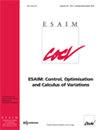部分未知域线性和半线性热方程的不敏感控制
IF 1.2
3区 数学
Q4 AUTOMATION & CONTROL SYSTEMS
Esaim-Control Optimisation and Calculus of Variations
Pub Date : 2022-11-07
DOI:10.1051/COCV/2018035
引用次数: 10
摘要
我们考虑一个具有Dirichlet边界条件和全局Lipschitz非线性的半线性热方程,它被置于一个有界域上,假设是参考域的一个未知扰动。我们感兴趣的是一个不敏感控制问题,它包括找到一个分布式控制,使得状态的某些函数在一阶对域的扰动不敏感。我们的第一个结果包括半线性热方程的近似不敏化性质。它依赖于一个线性化过程和一个适当的不动点定理的使用。对于线性情形,提出了适当的对偶理论,使问题可以看作是众所周知的唯一延拓定理的结果。我们的第二个结果是特定于线性情况的。我们证明了由一个或两个参数给定的变形族的精确不敏化性质。由于固有控制问题的非线性,没有对偶理论可用,因此我们的证明依赖于几何方法和直接计算。本文章由计算机程序翻译,如有差异,请以英文原文为准。
Insensitizing control for linear and semi-linear heat equations with partially unknown domain
We consider a semi-linear heat equation with Dirichlet boundary conditions and globally Lipschitz nonlinearity, posed on a bounded domain of ℝN (N ∈ ℕ*), assumed to be an unknown perturbation of a reference domain. We are interested in an insensitizing control problem, which consists in finding a distributed control such that some functional of the state is insensitive at the first order to the perturbations of the domain. Our first result consists of an approximate insensitization property on the semi-linear heat equation. It rests upon a linearization procedure together with the use of an appropriate fixed point theorem. For the linear case, an appropriate duality theory is developed, so that the problem can be seen as a consequence of well-known unique continuation theorems. Our second result is specific to the linear case. We show a property of exact insensitization for some families of deformation given by one or two parameters. Due to the nonlinearity of the intrinsic control problem, no duality theory is available, so that our proof relies on a geometrical approach and direct computations.
求助全文
通过发布文献求助,成功后即可免费获取论文全文。
去求助
来源期刊

Esaim-Control Optimisation and Calculus of Variations
Mathematics-Computational Mathematics
自引率
7.10%
发文量
77
期刊介绍:
ESAIM: COCV strives to publish rapidly and efficiently papers and surveys in the areas of Control, Optimisation and Calculus of Variations.
Articles may be theoretical, computational, or both, and they will cover contemporary subjects with impact in forefront technology, biosciences, materials science, computer vision, continuum physics, decision sciences and other allied disciplines.
Targeted topics include:
in control: modeling, controllability, optimal control, stabilization, control design, hybrid control, robustness analysis, numerical and computational methods for control, stochastic or deterministic, continuous or discrete control systems, finite-dimensional or infinite-dimensional control systems, geometric control, quantum control, game theory;
in optimisation: mathematical programming, large scale systems, stochastic optimisation, combinatorial optimisation, shape optimisation, convex or nonsmooth optimisation, inverse problems, interior point methods, duality methods, numerical methods, convergence and complexity, global optimisation, optimisation and dynamical systems, optimal transport, machine learning, image or signal analysis;
in calculus of variations: variational methods for differential equations and Hamiltonian systems, variational inequalities; semicontinuity and convergence, existence and regularity of minimizers and critical points of functionals, relaxation; geometric problems and the use and development of geometric measure theory tools; problems involving randomness; viscosity solutions; numerical methods; homogenization, multiscale and singular perturbation problems.
 求助内容:
求助内容: 应助结果提醒方式:
应助结果提醒方式:


